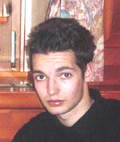Ana Borga: Do you think this type of meeting really means something or is it just to have fun?
Alexander Maleev: For me for sure it means something because it is my first project as a responsible leader. I always wanted to have my own program and make it well, so that the participants are satisfied. However, I believe that for the European Union (EU) it also has results, because our discussions and workshop projects might mean something in the future. In the EU they know how to deal with this sort of information and then work it or spread it. It also provokes awarness among the youngsters about this subject, because this is a intense type of exchange, in which people have to work together in the workshop´s and are “forced” to communicate and exchange personal opinions. But I must say it is also fun.
The EU new identity is nowadays a very common expression. Was it you who chose it as the main topic for this encountering? Why?
No, a whole team planned it a year ago. However, initially the gathering was supposed to happen in Braunau because Hitler was born there and we rather show the city in a different perspective. We wanted to make it in April, before the 1st of May (the official EU enlargement day), to see how were the expectancies of the different countries concerning this matter. Nevertheless, that was not possible and we thought that would still be interesting to have the first comment of the enlargement in the perspective of countries that had just entered the EU like Poland, other’s that were already in it like Portugal and Spain, and also countries that have not join the union yet, such as Bulgaria. In my opinion, this is still an interesting subject because since the party on first of May no one has talked about the changes, and we can not forget that people in the EU have different identities, and that the whole process is occurring very fast.
After this five days as the responsible, what can you tell us about this experience? Is it being worthwhile?
To be honest I was scared. We decided that this should be a type of gathering were there won’t be a full time guide and where participants have also responsibilities and interesting workshops to do, such as journalism, photography and video, and I didn’t know if it would turn out alright. Fortunately, most of people are doing very well; they are communicating, interacting and seem to be enjoying this experience. Although it’s still possible to distinguish the groups by their countries and I have to penalty myself for being usually late, I think this is going great and it will allow further cooperation.
In this meeting I realized that not everyone is so exciting to become part of the EU as some countries were at the beginning. As a Bulgarian what do you think of that?
In this type of subjects I think you have to give and give up many things to achieve something, is like people don’t want to talk English, but they know it’s good to communicate. Nowadays there’s many criticism, corrupt governments don’t convince people, and to be honest I don’t think this type of political approach will work out. In my point of view we are going in the wrong way, because people should be the first and not economy or politic. I think people, at least in Bulgaria, are scared and have many restrictions to an open market, because they think prices will rise up, and are afraid of corruption. However, Europe is still young, it’s growing fast and we will see...
If you were a magician and you could look into the future, what do you think it will be the main topic for an youth exchange like this one?
I don’t know. I think that this topic will still be a problem and therefore the theme of an exchange program like this. Maybe another topic will be the poverty inside EU, the possibility of seeing Europe as a whole, the terms of the unification, or something like that.


